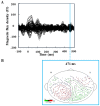Neural correlates of central inhibition during physical fatigue
- PMID: 23923034
- PMCID: PMC3724771
- DOI: 10.1371/journal.pone.0070949
Neural correlates of central inhibition during physical fatigue
Abstract
Central inhibition plays a pivotal role in determining physical performance during physical fatigue. Classical conditioning of central inhibition is believed to be associated with the pathophysiology of chronic fatigue. We tried to determine whether classical conditioning of central inhibition can really occur and to clarify the neural mechanisms of central inhibition related to classical conditioning during physical fatigue using magnetoencephalography (MEG). Eight right-handed volunteers participated in this study. We used metronome sounds as conditioned stimuli and maximum handgrip trials as unconditioned stimuli to cause central inhibition. Participants underwent MEG recording during imagery of maximum grips of the right hand guided by metronome sounds for 10 min. Thereafter, fatigue-inducing maximum handgrip trials were performed for 10 min; the metronome sounds were started 5 min after the beginning of the handgrip trials. The next day, neural activities during imagery of maximum grips of the right hand guided by metronome sounds were measured for 10 min. Levels of fatigue sensation and sympathetic nerve activity on the second day were significantly higher relative to those of the first day. Equivalent current dipoles (ECDs) in the posterior cingulated cortex (PCC), with latencies of approximately 460 ms, were observed in all the participants on the second day, although ECDs were not identified in any of the participants on the first day. We demonstrated that classical conditioning of central inhibition can occur and that the PCC is involved in the neural substrates of central inhibition related to classical conditioning during physical fatigue.
Conflict of interest statement
Figures






References
-
- Chaudhuri A, Behan PO (2004) Fatigue in neurological disorders. Lancet 363: 978–988. - PubMed
-
- Bigland-Ritchie B, Woods JJ (1984) Changes in muscle contractile properties and neural control during human muscular fatigue. Muscle Nerve 7: 691–699. - PubMed
-
- Pedersen TH, Nielsen OB, Lamb GD, Stephenson DG (2004) Intracellular acidosis enhances the excitability of working muscle. Science 305: 1144–1147. - PubMed
-
- Allen DG, Westerblad H (2004) Physiology. Lactic acid-the latest performance-enhancing drug. Science 305: 1112–1113. - PubMed
-
- Allen DG, Lamb GD, Westerblad H (2008) Skeletal muscle fatigue: cellular mechanisms. Physiol Rev 88: 287–332. - PubMed
Publication types
MeSH terms
LinkOut - more resources
Full Text Sources
Other Literature Sources
Medical

